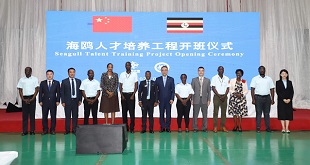
Local employer lobby extends translation and supervisory skills services to the investors
Kampala, Uganda | RONALD MUSOKE | For two decades now, hundreds of Chinese investors have flocked into Uganda to establish businesses but amongst the biggest challenges the Southeast Asian entrepreneurs often grapple with is “culture shock,” according to analysis from the Federation of Uganda Employers.
“They do not know how to deal with Ugandans and they also do not understand how our labour laws work,” Douglas Opio, the executive director of the Federation of Uganda Employers (FUE) toldThe Independent in an exclusive interview.
Over 700 private and Chinese government-backed entrepreneurs and companies are now well established in Uganda with several involved in construction, energy, hospitality, manufacturing, logistics, mining as well as the oil and gas sector. Many more are also into wholesale and retail business.
Statistics from the Uganda Investment Authority (UIA) show that since 2011, it has registered over US$ 1.2bn in planned investments from China. Data from the Ministry of Trade, Industry and Cooperatives also shows that trade between Uganda and China reached about US$ 932.8 million (Shs 3.3 trillion) in 2015 while Uganda’s exports to China fetched US$ 57.7 million (Shs 201bn).
Zhengzhou Qiang, the Chinese ambassador to Uganda said during the Uganda-China Economic and Trade Cooperation Forum in Kampala in 2018 that the East African nation is now among the top four investment destinations for Chinese entrepreneurs in sub-Saharan Africa.
But the ever growing Chinese business interests in Uganda have not gone without controversy, thanks to sometimes sensationalist media accounts. A section of Chinese businesses have been accused by their Ugandan employees of “exploitation,” maltreatment, and poor working conditions.
For instance, in 2017, over 400 Ugandan workers contracted by the China Railway Seventh Group laid down their tools accusing their bosses of sexual harassment, poor pay and unbalanced payment schemes.
Labour laws translated into Mandarin
In response, the Federation of Uganda Employers has designed a programme to specifically help Chinese entrepreneurs to do business in Uganda more responsibly.
The local employer lobby in collaboration with the Confederation of Norwegian Enterprise and the Confederation of China Enterprise Confederation – a Chinese employer’s association – has been translating Uganda’s labour laws into Mandarin.
The Federation has also been running a series of workshops for new Chinese businesses to enable them interact with the already established Chinese businesses in the country.
“We have been working on the local business culture to help the Chinese understand the way our culture works so that certain behaviours are not misinterpreted as disrespect or insubordination,” Opio told The Independent on Oct. 27.
“We have trained some of them on supervisory skills management so that the managers can understand certain things; the way people behave in Uganda and what the laws say,” he said.
“We are with them when there are disciplinary issues and we try as much as possible to translate most of our documents at the federation into Mandarin so that the Chinese business managers can read on their own.”
Opio told The Independent that the federation has also been encouraging local employees who have any issues with their Chinese employers to get in touch with the Federation of Ugandan Employers to try and resolve some of the issues.
Meanwhile, according to researcher Arsene Codrin, who visited Kampala in 2014 to study Ugandan employees’ attitudes towards their Chinese employers, Chinese business owners in Uganda are not independent of global economic and social conditions, and do not operate against or on the fringes of a capital driven world order.
In his paper titled, “Chinese Employers and Their Ugandan Workers: Tensions, Frictions and Cooperation in an African City,” Codrin found that generally; despite marked differences in social, economic, cultural, racial and linguistic backgrounds, the Chinese and their Ugandan employees often times find common ground to work together.
****
 The Independent Uganda: You get the Truth we Pay the Price
The Independent Uganda: You get the Truth we Pay the Price


